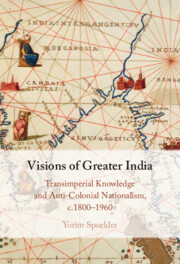Book contents
- Visions of Greater India
- Visions of Greater India
- Copyright page
- Contents
- Figures
- Acknowledgments
- Note on Spelling
- Abbreviations
- Introduction: Looking for India in Asia
- Part I The Knowledge Networks of Greater India
- Part II The Interwar Politics of Greater India
- 6 Connecting Orientalism and Internationalism
- 7 Disavowing Indian Exceptionalism
- 8 A New Nalanda in Bolpur
- Conclusion to Part II: Greater India as a Political Discourse in the Interwar Period
- Conclusion
- Epilogue: The Afterlives of Greater India
- Bibliography
- Index
7 - Disavowing Indian Exceptionalism
Sarkar, “Modern Greater India” and the Hindu Nationalist Imagination
from Part II - The Interwar Politics of Greater India
Published online by Cambridge University Press: 09 November 2023
- Visions of Greater India
- Visions of Greater India
- Copyright page
- Contents
- Figures
- Acknowledgments
- Note on Spelling
- Abbreviations
- Introduction: Looking for India in Asia
- Part I The Knowledge Networks of Greater India
- Part II The Interwar Politics of Greater India
- 6 Connecting Orientalism and Internationalism
- 7 Disavowing Indian Exceptionalism
- 8 A New Nalanda in Bolpur
- Conclusion to Part II: Greater India as a Political Discourse in the Interwar Period
- Conclusion
- Epilogue: The Afterlives of Greater India
- Bibliography
- Index
Summary
This chapter addresses how Greater India featured in the Hindu nationalist imagination and B.K. Sarkar’s oeuvre. Disavowing Indian exceptionalism, Greater India became a tool to trace and project the Hindu nation as a historical actor making its mark on the world. Magna India was imagined as a colonial sphere where the vigorous, manly Hindu imposed his national will. The twin objectives of challenging the East-West civilizational dichotomy and ‘restoring the nation to the world’ rested on reclaiming a form of historical agency that had been forgotten or ignored in British accounts. By stressing equivalence with the West and emphasizing the secular and ‘national’ agency of ‘world historical figures’ such as Ashoka and the Buddha, Sarkar sought to puncture the ‘myth’ of Indian civilization as other-worldly and mystical, and argued that ancient India had been a great colonizing, civilizing and secular power on a par with ancient Greece and Rome. Writing India into world history on decidedly Eurocentric terms inspired presentist calls for Young India to compete with the West. Such visions of a ‘Modern Greater India’ were linked to debates about the fate of Indian diaspora communities.
Keywords
- Type
- Chapter
- Information
- Visions of Greater IndiaTransimperial Knowledge and Anti-Colonial Nationalism, c.1800–1960, pp. 214 - 231Publisher: Cambridge University PressPrint publication year: 2023



